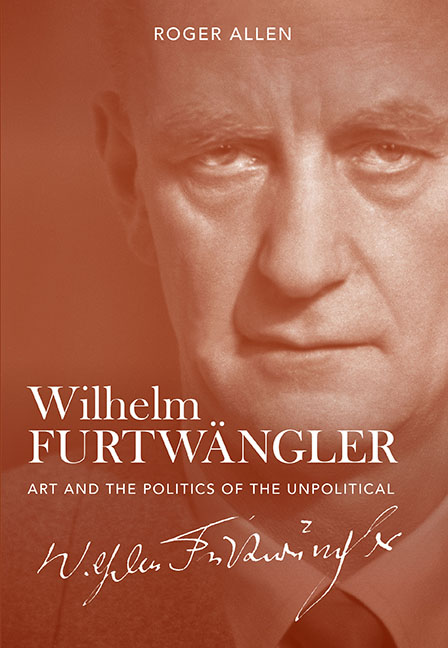Book contents
- Frontmatter
- Dedication
- Contents
- List of Illustrations
- List of Abbreviations
- Prelude
- Acknowledgements
- Preface
- Note on Translations
- Chronology
- Introduction
- 1 Wilhelm Furtwängler: The Historical, Cultural and Intellectual Background
- 2 Childhood and Youth (1886–1911)
- 3 Lübeck and Mannheim (1911–20)
- 4 Furtwängler in the Weimar Republic (1919–33)
- 5 Furtwängler and the Nazi State I (1933–35)
- 6 Furtwängler and the Nazi State II (1935–45)
- 7 Reflection and Reaction: Furtwängler in the Immediate Post-War Period (1945–50)
- 8 Furtwängler as Symphonist
- 9 ‘All Greatness is Simplicity’ (1951–54)
- 10 Afterword
- Appendix 1 Two Furtwängler Essays
- Appendix 2 Thomas Mann, ‘Germany and the Germans’ (1945)
- Appendix 3 Audio and Visual Sources
- Bibliography
- Index
- Frontmatter
- Dedication
- Contents
- List of Illustrations
- List of Abbreviations
- Prelude
- Acknowledgements
- Preface
- Note on Translations
- Chronology
- Introduction
- 1 Wilhelm Furtwängler: The Historical, Cultural and Intellectual Background
- 2 Childhood and Youth (1886–1911)
- 3 Lübeck and Mannheim (1911–20)
- 4 Furtwängler in the Weimar Republic (1919–33)
- 5 Furtwängler and the Nazi State I (1933–35)
- 6 Furtwängler and the Nazi State II (1935–45)
- 7 Reflection and Reaction: Furtwängler in the Immediate Post-War Period (1945–50)
- 8 Furtwängler as Symphonist
- 9 ‘All Greatness is Simplicity’ (1951–54)
- 10 Afterword
- Appendix 1 Two Furtwängler Essays
- Appendix 2 Thomas Mann, ‘Germany and the Germans’ (1945)
- Appendix 3 Audio and Visual Sources
- Bibliography
- Index
Summary
In me there are two souls, alas, and their
Division tears my life in two.
One loves the world, it clutches her, it binds
Itself to her, clinging with furious lust;
The other longs to soar beyond the dust
Into the realm of high ancestral minds.
The life of Wilhelm Furtwängler (1886–1954) spans three failed attempts to create a German national state. The young Furtwängler spent his journeyman years and began his professional career during the final years of the Wilhelmine Empire (1871–1918), that overweening political construct of Chancellor Otto von Bismarck – so sharply caricatured by Heinrich Mann in his novel Man of Straw (Der Untertan) – which came to an inglorious end in the cataclysmic upheavals of World War I and the aftermath of the shock defeat of 1918. The older Furtwängler rose to prominence in the experimental years of the Weimar Republic (1919–33), a brave but ultimately unsuccessful attempt to found a modern democratic state that imploded and opened the door for the rise of Nazism. His most notable achievements as a performing artist were as a high-profile representative of the totalitarian Third Reich (1933–45), during which years he gave performances of works from the central Austro-German canon of musical masterworks that helped give a carapace of cultural authority to a barbaric regime. The final nine years of his life were passed in attempting to come to terms with the very different context of post-war Europe, and through performances, recordings and the composition of large-scale symphonies rehabilitate the politically compromised culture of which he had been so prominent a representative.
It is clear from the above brief outline that the life of Wilhelm Furtwängler brings us very close to great historical themes of the age. Unsurprisingly, therefore, the question that casts a long shadow over his reputation is that of his relationship with the Third Reich. Furtwängler always claimed that art, and by association he himself as an artist, was above politics; yet as historian Richard Evans has pointed out
of all the myths of German history that have been mobilised to account for the coming of the Third Reich in 1933, none is less convincing than that of the ‘unpolitical German’.
- Type
- Chapter
- Information
- Wilhelm FurtwänglerArt and the Politics of the Unpolitical, pp. 1 - 5Publisher: Boydell & BrewerPrint publication year: 2018



